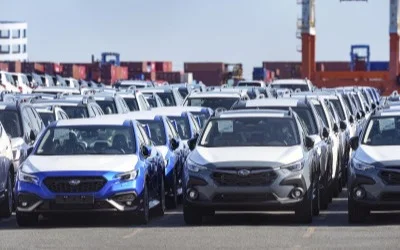Trump shows no willingness to compromise on Japan auto tariffs
U.S. President Donald Trump made clear in an interview broadcast Sunday that he has no plans to roll back hefty auto tariffs imposed on Japan, despite its strong opposition expressed in now-stalled negotiations, Kyodo reports.

Trump said his administration is ready to unilaterally send letters "starting pretty soon" to Japan and many other trading partners informing them of tariff rates for their exports to the United States.
Trump's reaffirmation of his position comes as his administration's 90-day pause on country-specific tariffs is set to expire on July 9 and amid stalled talks with Tokyo, particularly over its April increase in the duty on imported automobiles to 27.5 percent from 2.5 percent.
"I could send one (letter) to Japan. Dear Mr. Japan, here's the story. You're going to pay a 25 percent tariff on your cars," Trump said on Fox News, when asked about the possibility of extending the pause, using Japan, a key ally of the United States, as an example.
"They won't take our cars, and yet, we take millions and millions of their cars into the United States. It's not fair," he said. "I explained that to Japan, and they understand it. And we have a big deficit with Japan, and they understand that too."
Japan's top tariff negotiator, Ryosei Akazawa, arrived in Washington on Thursday for his seventh round of ministerial tariff talks. His latest trip comes after Japanese Prime Minister Shigeru Ishiba and Trump failed to strike a deal when they met in Canada earlier this month.
Although Akazawa pushed back his original planned departure by one day to Sunday, he was unable to secure a meeting with U.S. Treasury Secretary Scott Bessent, a key figure in Trump's trade strategy.
During his stay, Akazawa met for about an hour with U.S. Commerce Secretary Howard Lutnick and spoke with him twice by phone, but significant differences apparently remain over the Trump administration's treatment of the Japanese auto industry.
In the interview, Trump also said that Japan could purchase "a lot of oil" and other goods from the United States to reduce the trade deficit.
"Some countries, we don't care," he added. "We'll just send a high number out...we don't have to meet. We understand. We have all the numbers."
By sending out letters, Trump noted that they would say, "Congratulations. We're allowing you to shop in the United States of America. You're going to pay a 25 percent tariff, or a 35 percent or a 50 percent or a 10 percent."
Trump allowed the 90-day pause to facilitate negotiations toward deals, especially with 18 major U.S. trading partners, including India, Japan, the European Union and South Korea.
Trump now seems to be less mindful of the pause deadline, which only applies to country-specific tariffs under his reciprocal scheme covering about 60 trading partners that have notable trade surpluses with the United States.
The pause does not affect his baseline tariff of 10 percent, targeting imports globally, nor does it cover the sector-based levies on cars and auto parts which are already in effect.
His remarks also appeared to contradict those recently made by Bessent, who suggested the United States could roll the pause deadline forward if key U.S. trading partners continue to negotiate "in good faith," or it could wrap up negotiations with them by Labor Day on Sept. 1.
As stated previously, U.S. President Donald Trump could extend his administration's 90-day pause on so-called reciprocal tariffs, set to expire on July 9, the White House said Thursday.
